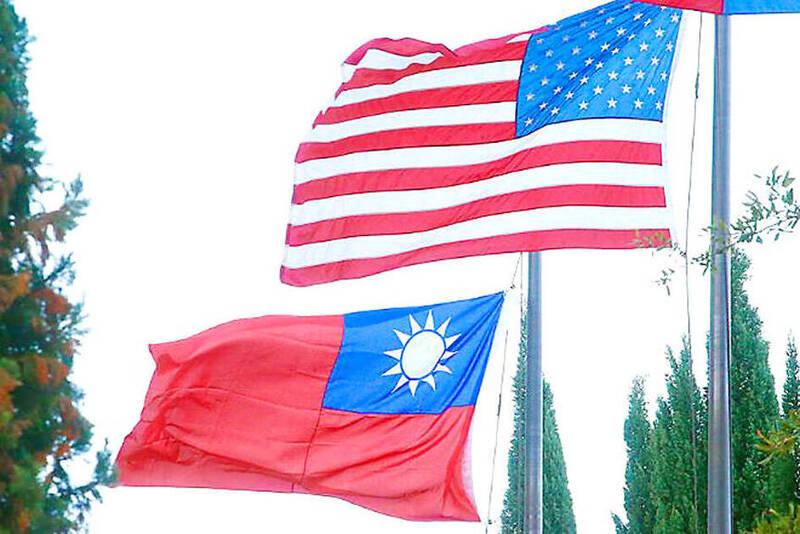《TAIPEI TIMES》 Taiwan must enhance ‘asymmetric’ defense: experts

The national flags of Taiwan and the US fly outside a hotel in Houston, Texas, on Jan. 8, 2017, during a transit stop by then-president Tsai Ing-wen on her way to Central America. Photo: CNA
PORCUPINE: RAND Corporation analysts said Taiwan should desist in purchasing big-ticket items like tanks and submarines, and transition to lighter, more mobile platforms
By Jonathan Chin / Staff reporter, with CNA
Taiwan must enhance asymmetric warfare capabilities, raise its military budget and focus on acquiring the kinds of weapons truly needed for fighting a large-scale war with China to survive the shifting balance of power in the Indo-Pacific, US experts said.
In an article published in Foreign Policy on Monday last week, Rand Corporation analysts Raymond Kuo, Michael Hunzeker and Mark Christopher called on Washington to recalibrate its approach to Taiwan as President William Lai (賴清德) took office.
Washington’s policy stance on the Taiwan Strait formerly emphasized restraining the martial law regime in Taiwan from making reckless decisions, while paying less attention to deterring Beijing, as the US military enjoyed a marked superiority and was sure to defeat Chinese forces should a conflict break out, they said.
The situation has changed, as Taiwan is now a mature democracy whose government bows to the wishes of a public that is keenly aware of the risks posed by a war with China, they said.
China’s military power has increased, with Beijing spending almost as much on defense as Washington and building the world’s largest navy, even as the number of US warships is projected to fall, they said.
“It is time for Washington to treat Taiwan like a serious partner rather than engaging in symbolic gestures that do nothing for its defense,” they said.
Taiwan should be held to the same standards by the US as those of a respected partner, they said.
This means Washington should call out the numerous flaws in Taiwan’s military posture, including inadequate defense spending, little training for ground troops and wasting limited funds on expensive platforms ill-suited for defending the nation in a large-scale war, they said.
“The US must make clear that Taipei needs to play a meaningful role in its own defense [and] stop applauding perfunctory attempts at increasing Taiwan’s defense spending and implementing defense reform,” they said.
The authors said that Washington should pressure Taiwan to “adopt a genuinely asymmetric defense posture, revitalize training for ground and reserve units, and radically upgrade its civil defense preparations.”
Taipei would have to increase its defense budget to far more than the 2.6 percent of GDP it plans to spend this year to make good for years of neglect in national defense and keep pace with China’s rapidly growing capabilities, they said.
They urged US policymakers to ensure that the US arms manufacturers prioritize their contracts with Taiwan over other foreign nations to clear the US$19 billion in backlogged weapon systems and equipment purchased by Taiwan, so that they could be delivered as soon as possible.
“Washington should be willing to hold Taipei to account by making future foreign military financing and sales deals conditional on verified progress toward these goals,” they said.
Additionally, the US should support the development of Taiwan’s defense industrial base with coproduction and technology transfers to help it acquire truly urgently needed materiel: spare parts, ammunition, anti-air, anti-tank and anti-ship missiles, and drones, they said.
“Washington should also make clear that it will not support Taiwan’s continued pursuit of capabilities that are ill-suited for defending against a full-scale attack,” they said, adding that the Ministry of National Defense “spends far too much money” on tanks, frigates, amphibious assault ships and submarines.
These expensive platforms are too small in numbers and most are “vulnerable to being destroyed by a qualitatively and quantitatively superior PLA in the earliest stages of a war,” they warned.
“Lai’s inauguration offers a logical turning point in the United States-Taiwan relationship,” they said. “Washington should use this moment to demonstrate a seriousness of purpose that has thus far been lacking.”
新聞來源:TAIPEI TIMES













